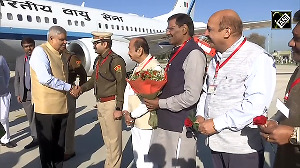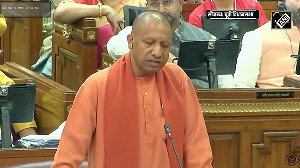Prime Minister Narendra Modi will push for stepping up global cooperation against the key issue of cross border tax avoidance and evasion at the G20 summit
 Echoing Prime Minister Narendra Modi's views that improving the health of financial markets alone cannot fuel growth, G20 business leaders on Friday said vigorous efforts should be made to go beyond fiscal and monetary policy to kick-start world economy and create jobs.
Echoing Prime Minister Narendra Modi's views that improving the health of financial markets alone cannot fuel growth, G20 business leaders on Friday said vigorous efforts should be made to go beyond fiscal and monetary policy to kick-start world economy and create jobs.
The B20 leaders, who met on the sidelines of the summit of leaders of the Group of 20 leading and developing economies here, called on them to commit to a bold reform agenda and ambitious individual country growth strategies.
A statement from B20, a grouping of business leaders of G20 members, said the group's chairman Richard Goyder would be asking the G20, of which India is a member, to make commitments in five key policy areas -finance, human capital, infrastructure, trade and transparency to drive growth and employment outcomes.
"Since the onset of the financial crisis, governments have tackled low growth with fiscal and monetary policy," Goyder said. "But this level of spending is clearly not sustainable and is not inspiring the commercial and consumer confidence needed to kickstart the global economy."
Prime Minister Narendra Modi will push for stepping up global cooperation against the key issue of cross border tax avoidance and evasion at the G20 summit.
Modi, who is the first Indian prime minister to visit Australia in 28 years since Rajiv Gandhi in 1986, arrived here on a five-day trip to Australia on the second leg of his 10-day three-nation tour.
He will also undertake a bilateral visit to the Australian capital Canberra for talks with Premier Tony Abbott on Tuesday.
The prime minister will also utilise the two-day 9th G20 summit of the world's biggest developed and emerging economies, to flag India's concerns over "jobless growth" prospects.
Ahead of the summit, Modi felt that focusing on transforming the quality of life of people and not just on issues like the health of the financial markets was necessary for creating employment-generating economic growth.
After an overnight flight from Myanmar capital Nay Phi Taw, where he attended two back-to-back international summits and had a string of bilateral meetings, Modi reached here. "Reached Brisbane. It is bright and sunny outside," Modi tweeted. He was received at the airport by the Queensland Premier Campbell Newman among others. Indian High Commissioner in Australia Biren Nanda was also present.
"A key issue for me would be to highlight the importance of international cooperation against black money," Modi had said, as he is set to renew the country's commitment to a global response to deal with cross border tax avoidance and evasion.
Modi had also said he intends to discuss how G20 can accelerate creation of next generation infrastructure, which also includes digital infrastructure and ensure access to clean and affordable energy.
The G20 includes 19 individual countries - Argentina, Australia, Brazil, Canada, China, France, Germany, India, Indonesia, Italy, Japan, South Korea, Mexico, Russia, Saudi Arabia, South Africa, Turkey, the UK and the US - and the European Union.
Collectively, the G20 economies account for around 85 per cent of the gross domestic product, 80 per cent of world trade and two-thirds of the world population. The G20 was launched in 2008 in the US.












 © 2025
© 2025